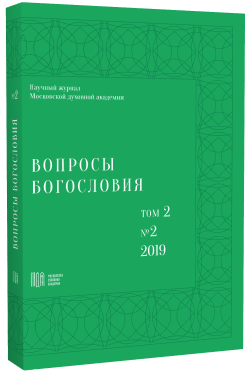Hypothetical Logoi of Dionysius the Areopagite
DOI:
https://doi.org/10.31802/PWG.2021.5.1.004Keywords:
creation,, Dionysius the Areopagite, God,, hierarchy of being, hypothesis, knowledge of God, logoi, PlatoAbstract
In the Mystical Theology, the Areopagite mentions «hypothetical logoi» and «hypothetical kataphasis». What is the probable meaning of the term «hypothetical» in the Areopagite work? This term appears in the context of the story of Prophet Moses’ ascent onto Mount Sinai. The Areopagite uses the biblical story as a paradigm of knowledge of the incomprehensible God. The Areopagite states that knowledge of God by a human being, after having overcome everything sensory and intelligible, reaches its limit, which he characterizes as hypothetical logoi. Researchers interpret the Areopagite’s «hypothetical logoi» in different ways: as «the rationale which presupposes» (P. Rorem), or as basic ideas (J. Vanneste), or as presence of God in the noumenal world (Y. de Andia), or as the second hypothesis of Parmenides (E. Corsini). The Areopagite’s hypothetical logoi succeed to the Platonic tradition. They retain the character of assumption and manifest an infinite approximation to the limit. Hypothetical logoi are a mediator between the two poles of being and thinking. They are the limit beyond which lies Plato’s «unhypothetical principle» and the Areopagite’s Divine Darkness. This is the limit of affirmative cognition (hypothetical kataphasis). According to the Areopagite, the ascent of a creature to the unity with God is hypothetical: the limit is removed only by the descent of God. Hypothetical logoi are a contact point of the Creator and the creation, and the point of the paradigmal development of hierarchies of the creation. The Areopagite’s consilience of a radical effort and the divine peace is not alien to the ancient Greek worldview.
Downloads
References
Pseudo-Dionysius Areopagita. Corpus Dionysiacum. Bd. II: De coelesti hierarchia. De ecclesiastica hierarchia. De mystica theologia. Epistulae / hrsg. von G. Heil und A. M. Ritter. 2. Auflage. Berlin; Boston: De Gruyter, 2012. (PTS; Bd. 67).
Аристотель. О софистических опровержениях // Аристотель. Сочинения: в 4 т. Т. 2. М.: Мысль, 1978. (Философское наследие; т. 76). С. 533–593.
Гомер. Илиада / пер. с др.-греч. Н. И. Гнедича. М.: Эксмо, 2017.
Дионисий Ареопагит. О мистическом богословии / пер. с др.-греч. свящ. Л. Лутковского // Мистическое богословие. Киев: Путь к Истине, 1991. С. 5–12.
Дионисий Ареопагит. О таинственном богословии / пер. с др.-греч. В. В. Бибихина // Историко-философский ежегодник’90. М.: Наука, 1991. С. 227–232.
Дионисий Ареопагит. О Божественных именах. О мистическом богословии / пер. с др.‑греч. Г. М. Прохорова. СПб.: Глаголъ, 1994.
Дионисий Ареопагит. О небесной иерархии / пер. с др.-греч. М. Г. Ермаковой. СПб.: Глаголъ, 1997.
Дионисий Ареопагит. Таинственное богословие / пер. с др.-греч. А. Ф. Лосева // Лосев А. Ф. Имя: Сочинения и переводы. СПб.: Алетейя, 1997. С. 458–463.
Платон. Государство / пер. с др.-греч. А. Н. Егунова // Платон. Собрание сочинений: в 4 т. Т. 3. М.: Мысль, 1994. С. 79–420.
Лосев А. Ф. История античной эстетики. Т. 8: Итоги тысячелетнего развития. Кн. 2. М.: АСТ, 2000.
Altenburg M. Die Methode der Hypothesis bei Platon, Aristoteles und Proklus. Marburg: N. G. Elwert,1905.
Andia Y., de. Henosis: L’Union à Dieu chez Denys l’Aréopagite. Leiden; New York; Köln: Brill, 1997.
Corsini E. Il trattato «De Divinis Nominibus» dello Pseudo-Dionigi e i commenti neoplatonici al Parmenide. Torino: Giappichelli, 1962.
Rorem P. The Dionysian Mystical Theology. Minneapolis: Fortress Press, 2015.
Vanneste J. Le mystère de Dieu: Essai sur la structure rationnelle de la doctrine mystique du pseudo-Denys l’Aréopagite. Paris: Desclée de Brouwer, 1959.
Völker W. Kontemplation und Ekstase bei Pseudo-Dionysius Areopagita. Wiesbaden: F. Steiner, 1958.
Downloads
Published
How to Cite
License
Copyright (c) 2021 Прасолов Михаил Алексеевич

This work is licensed under a Creative Commons Attribution-ShareAlike 4.0 International License.







